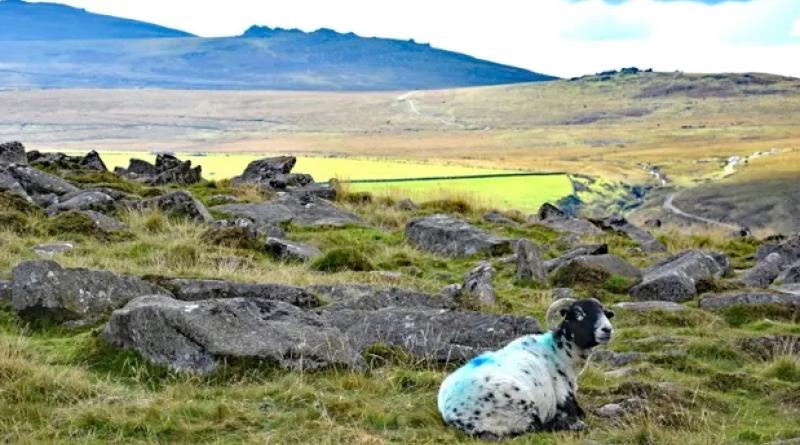England’s farmers to be paid to rewild land

Nature recovery schemes are part of post-Brexit subsidies overhaul, but eco campaigners are sceptical
Farmers in England will be given taxpayers’ cash to rewild their land, under plans for large-scale nature recovery projects announced by the government. These will lead to vast tracts of land being newly managed to conserve species, provide habitats for wildlife and restore health to rivers and streams.
Bids are being invited for 10-15 pilot projects, each covering at least 500 hectares and up to 5,000 hectares, to a total of approximately 10,000 hectares in the first two-year phase – about 10 times the size of Richmond Park in London. These pilots could involve full rewilding or other forms of management that focus on species recovery and wildlife habitats.
Rare fauna such as sand lizards, water voles and curlews will be targeted, with the aim of improving the status of about half of the most threatened species in England.
The exact funding has not been disclosed, as bids will be compared to determine value for money before a final decision on which should go ahead is made this summer. However, the total amount available for such schemes is expected to reach £700m to £800m a year by 2028. By 2042, the government aims to have up to 300,000 hectares of England covered by such “landscape recovery” projects – an area roughly the size of Lancashire.
Ministers also plan to offer English farmers payments for “local nature recovery”. The smaller-scale actions taken on their farms could include planting more trees, restoring peatlands or wetlands and leaving space for wildlife habitats. These payments, which will be revealed later this year, should also reach up to £800m a year by 2028.
George Eustice, the secretary of state for environment, food and rural affairs, said the aim was for wildlife and nature protection to run alongside food production as a matter of course for most farmers. He is expected to tell farmers at the Oxford Farming Conference on Thursday: “We want to see profitable farm businesses producing nutritious food and underpinning a growing rural economy, where nature is recovering and people have better access to it. Through our new schemes, we are going to work with farmers and land managers to halt the decline in species, reduce our greenhouse gas emissions, increase woodland, improve water and air quality and create more space for nature.”
As well as the two new schemes – landscape recovery and local nature recovery – farmers will also be able to apply for payments to help them protect their soil and take other basic environmental protection measures, under plans announced last year. Funding for these measures will also reach about £800m a year, as part of the post-Brexit overhaul of the £2.4bn-a-year farming subsidies into a system of “public money for public goods”. This means farmers are paid for making environmental improvements, rather than the amount of land they farm.
Green campaigners were sceptical over whether the new payments would be enough to meet the government’s aim of halting the loss of wild species abundance and managing 30% of land for the good of nature by 2030, as well as ensuring that farmers help to solve the climate crisis rather than add to it. The Wildlife Trusts, RSPB and National Trust charities said detail on how the schemes would work was still lacking.
Craig Bennett, the chief executive of The Wildlife Trusts, said: “The real test of this agricultural transition is not whether it is a little bit better or moderately better than what came before, but whether it will be enough to deliver on [the government’s targets]. Anything less than that means that this historic opportunity will have been wasted. While we’re hearing the right noises from the government, the devil will be in the detail and the detail is still not published nearly six years after the EU referendum.”
The schemes would fail unless more was done to help farmers move away from intensive practices, said Jo Lewis, the policy and strategy director at the Soil Association. This could include the introduction of ambitious targets for reducing pesticide and fertiliser use.
“These schemes won’t work in isolation. They risk failure if they are forced to compete with mounting commercial pressures that encourage more intensive farming and cheap food production, for which the environment and our health ultimately pay the price,” she said.
Though some are benefiting from high grain prices, many farmers are facing a difficult outlook, with rising input costs, plummeting exports due to Brexit red tape, and potential new competition from prospective importers after post-Brexit trade deals.
Martin Lines, the UK chair of the Nature Friendly Farming Network, said that farmers who already take environmental measures were “left in limbo” before the schemes start in 2024. “Government has been running similar environmental stewardship schemes voluntarily for farmers for 20 or 30 years, yet we still have seen huge declines in wildlife. We need these schemes to be bolder and more ambitious, not just delivering more of the same with minor improvements,” he said.
Tenant farmers, who work on about a third of farmed land in the UK, are concerned over how they can access the new schemes. They also fear that their landlords may take advantage of large-scale rewilding to remove their tenancies.
George Dunn, of the Tenant Farmers Association, said: “It is alarming that, after at least three years of discussions with the Department for Environment, Food and Rural Affairs, it has no clear plan for access to these schemes by tenant farmers. [Current payments] are being removed while we have a vague commitment for further work to be undertaken on how tenants, and those who use common land, can access schemes. It does feel like we are pushing water uphill.”
Mark Tufnell, the president of the Country Land and Business Association, which represents 28,000 farmers, landowners and rural businesses, said: “The government must also ensure that policy changes look towards domestic food production and security. Britain is already at the forefront of agricultural innovation and animal welfare standards, and we must do more to make certain that our great produce is supported here and abroad. We need to guarantee that profitable agriculture remains a core part of the rural economy and feeds the nation sustainably.”
Fiona Harvey Environment correspondent
Cover photo:
Farmers in areas such as Dartmoor in Devon, where there is a significant rewilding campaign, will be invited to bid for 10-15 pilot projects. Photograph: dpe123/Getty/iStockphoto





